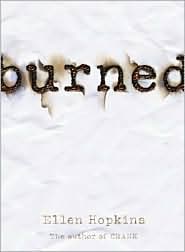Most days, I see these chunky, ominous-looking books with one-word titles all written by Ellen Hopkins, and at first, I couldn't quite figure out if they were part of a series or not. They have titles like Crank and Impulse, and something about the fonts chosen for the cover designs remind me of horror films, particularly Saw. Right or wrong, I judge books by their covers, so if you know me at all, it goes without saying that I'm not attracted to these books. But I can't help but notice that students devour them.
 Then, after our Book Club discussion of Go Ask Alice, we were discussing our current and recent reads, a student brought up Hopkins' books and explained, to my surprise, that they are written in verse, which explains why students breeze through them despite the page-length. Another student chimed in to explain that the author arranges the words on the page so that the poem can be read from different directions – left to right, top to bottom, corner to corner – to glean extra meaning. Now, I was intrigued. So when I learned Ellen Hopkins would be at the Book Fest in Bowling Green, I ran out and bought Burned. I couldn't bring myself to read Crank after having re-read Go Ask Alice. I can only read about so much drug use.
Then, after our Book Club discussion of Go Ask Alice, we were discussing our current and recent reads, a student brought up Hopkins' books and explained, to my surprise, that they are written in verse, which explains why students breeze through them despite the page-length. Another student chimed in to explain that the author arranges the words on the page so that the poem can be read from different directions – left to right, top to bottom, corner to corner – to glean extra meaning. Now, I was intrigued. So when I learned Ellen Hopkins would be at the Book Fest in Bowling Green, I ran out and bought Burned. I couldn't bring myself to read Crank after having re-read Go Ask Alice. I can only read about so much drug use.I read the first 50 pages (lots of white space) sitting on a couch at Opry Mills mall while my teacher friends Sarah and Jill perused a last few stores. Pattyn, the narrator (or speaker, I should say), opens her narrative openly addressing her suicidal thoughts, her feelings of not belonging. It is cliché, but it's relatable. The exposition continued to pull me in, mostly because she spent several "poems" describing her journey as a reader. She mentions reading C. S. Lewis and Madeleine L'Engle, and I was sold. This girl and I are birds of a feather! She soon reveals that her reading life is an escape from her oppressive home life.
Her Nevada family is headed by an abusive father, whom she describes as having an affair-like relationship with Johnnie Walker Black whisky, and her apathetic mother who delegates the parenting of the five or six other daughters to Pattyn. She is frustrated by the teachings of her family's Mormon faith, and she particularly struggles with the expectation of being a submissive female. Not only does she distract herself with literature, she frequently takes to the desert to practice shooting her gun, an interest she used to share with her father until he picked up the bottle.
The foreshadowing is blatant. She rebels and, as punishment, is sent off to live with her aunt, an experience that turns out to be the best thing that ever happens to her. She has an awakening, but it's clear that Hopkins doesn't believe in happily ever after.
I can understand that. Nice, neat little packaged resolutions are hard to believe, but sometimes so are cautionary tales. I'm still trying to decide if Pattyn and her story are believably complex.
And the verse. Hopkins admittedly does some cool stuff with the words, but I'm not sure she didn't just take prose paragraphs and hit enter and tab so that it looked cool. And when multiple readings were possible, I found the phrasing forced. Thank goodness, though, that the story was condensed into short poems that filled less than half the printable area of the pages, or I would've never made it through 531 pages.
Maybe I didn't choose the best of her books to start with. Maybe it's because I'm not a teenager. I wasn't bowled over, but really, I want to know why the kids are. I mean, when I was in high school, I loved Go Ask Alice, but now, I'm not so impressed. I suppose adolescents are more comfortable with a world that is black and white, rules with clear consequences.
One person has voted for Identical, the other Hopkins book that I have, for my next reading. Still only one vote for The Hunger Games. Big Fat Manifesto and Feed are tied for first with two votes each. What's it gonna be?

No comments:
Post a Comment